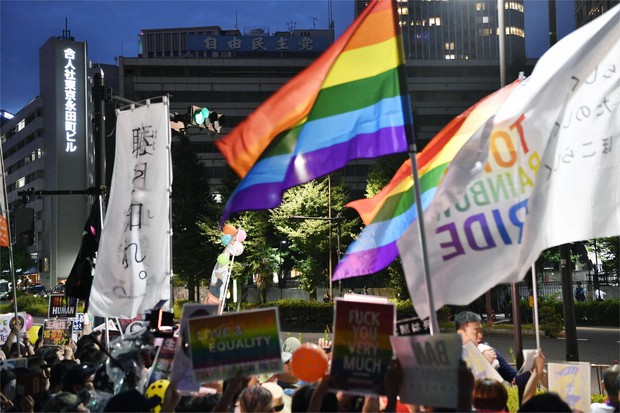TOKYO : The first survey of its kind conducted by the Heath, Labor and Welfare Ministry also showed more than 30 percent of respondent companies have no plans to rectify the situation that leaves lesbian, gay, bisexual and transgender people on the outer.
Just over 10 percent of companies in Japan have policies aimed at protecting the rights of sexual minorities, a recent government survey revealed, reflecting the nation’s lack of progress in addressing workplace inequality.
The survey was conducted late last year, covering 10,000 firms with 50 or more employees, of which 2,388 responded.
It showed larger firms were more likely to have made arrangements for LGBT staff, with 41.3 percent of companies with 1,000 or more workers taking measures such as implementing education initiatives, compared with 9.4 percent of firms with 100 to 999 workers, and 3.5 percent of firms with 99 or fewer workers.
Among respondents that have taken measures, 41.3 percent said they have made efforts to educate their workforce on LGBT awareness and 38.8 percent said they have internal counseling available for staff.
Japan’s anti-harassment law prohibits public outing, but the percentage of companies that have created internal rules on such harassment related to sexual orientation and gender identification stood at only 31.8 percent.
A total of 16.1 percent of firms allow workers in same sex-relationships to take congratulation leave when they are married or condolence leave when their partner passes away, while just 8.7 percent provide a family allowance for partners.
In consideration of transgender staff, just 11.6 percent allow workers to use a name other than their legal name, and 13.6 percent allow employees to use bathrooms in accordance with the gender to which they identify, the survey showed.
Of companies that said they are working on or planning to work on measures to better accommodate the needs of LGBT employees, 50.8 percent said they find it difficult to grasp the opinions of LGBT workers and what is required for them, and 40.6 percent said they do not know what kind of measures are necessary.


![[商品価格に関しましては、リンクが作成された時点と現時点で情報が変更されている場合がございます。] [商品価格に関しましては、リンクが作成された時点と現時点で情報が変更されている場合がございます。]](https://hbb.afl.rakuten.co.jp/hgb/1bc09d1d.62f92ec3.1bc09d1e.f467792b/?me_id=1363461&item_id=10000231&m=https%3A%2F%2Fthumbnail.image.rakuten.co.jp%2F%400_mall%2Fsuperdeal%2Fcabinet%2Foppo_a5_2020%2Foppo_thumb01_40.jpg%3F_ex%3D80x80&pc=https%3A%2F%2Fthumbnail.image.rakuten.co.jp%2F%400_mall%2Fsuperdeal%2Fcabinet%2Foppo_a5_2020%2Foppo_thumb01_40.jpg%3F_ex%3D240x240&s=240x240&t=picttext)


